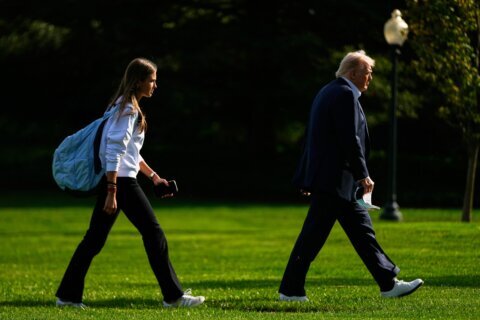A forced delay is not the way Tiger Woods wanted to hold on to the green jacket for winning the 2019 Masters Golf tournament.
The green jacket is one of the most coveted prizes in sports and the passing of the jacket from champion to champion is one of the many special traditions linked to the tournament played every April at Augusta National Golf Club.
Like everyone else with the world on pause due to the coronavirus pandemic, the golf world has had to adjust its schedule.
The hope is that three of the four majors will still be played, with the Masters in November coming after the U.S. Open in September and the PGA Championship in August. The 2020 British Open was canceled.
Last April, when Woods won the Masters, it was the first time he had ever won a major championship when trailing entering the final round.
It was Woods’ fifth Masters title, but first time wearing the green jacket since 2005.
The 2019 Masters was also Woods’ first victory in any tournament since 2013 — and first win in a major in 11 years.
Woods has 15 major titles three behind Jack Nicklaus’ record of 18 major titles.
“When Tiger won the Masters he was definitely back,” best-selling author John Feinstein told WTOP.
“His career has always been about winning major championships. I think the one thing about that (2019) Masters was he probably appreciated it more than any of the first 14 (major titles).
“When he dominated golf, he pretty much took it for granted he was going to win a major or two every year,” Feinstein said.
If the Masters is able to be played in November of this year, the schedule change will have an impact on how the tournament is played.
Augusta, Georgia, in November is not the same as Augusta in April and the change of seasons will naturally mean in change in the condition of the course.
Feinstein recently talked to two-time Masters champion Tom Watson, who reminded him the greens at Augusta are always dependent on weather.
If the weather is dry in April or November, the greens will be fast to the liking of the players. If there is rain, the greens will be slower and harder to read.
“The bigger question will be how much the fairways will run,” Feinstein said. “It will be hard for them (groundskeepers) in just a month to get the fairways to where they normally have them by April.
“It could make the golf course harder, because slower fairways mean the ball will not travel as far once it hits the ground,” he said.
John Feinstein’s new book is “The Back Roads to March: The Unsung, Unheralded, and Unknown Heroes of a College Basketball Season.”








